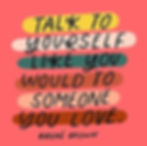What’s in your Self-Care Toolbox?
- Don't Be A Monster
- Jun 7, 2020
- 4 min read
Updated: Jul 6, 2020

One of the best things to come out of the recently growing awareness of mental health is that people have started talking about “self-care”. For those who don’t know, self-care “is the practice of taking an active role in protecting one's own well-being and happiness, particularly during periods of stress” (Oxford Dictionary). Self-care is an important technique to learn for improving or maintaining good mental health. Good mental health leads to lower instances of bullying, violence, self-harm, and suicide. Self-care is not only for adults in high-stress work environments- it is something that kids can gain a lot from by learning at a young age. They can then bring these tools with them into increasingly stressful stages of life, as they grow older. That is why we incorporate self-care strategies into every Don’t Be A Monster presentation.
So what does self-care look like? Everyone’s self-care routine is unique to them. Self-care is not one strict list of steps to follow to automatically cure your stress or anxiety, but rather a toolbox of ways to take control of your emotions and improve your well-being. Your self-care toolbox is 100% personalized by you!

Self-care strategies can be broken down into five distinct categories: physical, mental, spiritual, social, and emotional. Think of them as the different drawers in your toolbox- each “drawer” has different kinds of tools to address similar issues. Let’s take a look at each self-care drawer and find out what tools they hold.
Physical
Physical self-care includes activities that help you to stay fit and healthy and energize you so you feel good in the skin you're in.
Physical self-care helps to make you feel confident, energized, strong, and empowered. Practice physical self-care when you are feeling tired, out of control, uncertain, or self-conscious.
Examples: Exercising, going for a walk during your lunch break, taking sick-leave from work, eating a healthy breakfast, spending time outside, or going to sleep on time.

Mental
Mental self-care is being aware of how the way you think and the things that occupy space in your mind have a strong effect on your psychological well-being. Mental self-care includes doing things that keep your mind sharp, and doing things that help you stay mentally healthy. It’s important that we exercise our brains by challenging ourselves, but it is equally important that we show ourselves compassion and patience.
Mental self-care helps to make you feel comfortable, smart, confident, intrigued, and alert. You should practice mental self-care when you are feeling uninterested, overwhelmed, self-loathing, ashamed, or self-critical.
Examples: practicing gratitude, giving yourself breaks, completing a puzzle, reading a book, unfollowing media accounts that make you feel bad, focusing on the present moment.

Spiritual
Spiritual self-care is the practice of including a spiritual or religious aspect into your life. You do not have to join any organized religion to practice spiritual self-care- you can nurture your spirit individually on your own terms. Spiritual self-care is the nurturing of your soul or spirit. It is having the perspective beyond your own individual day to day life.
Spiritual self-care can help you feel more connected to others and the world around you. It can make you feel grounded, open-minded, and present. You can practice spiritual self-care when you feel lonely, overwhelmed, grief, or scared.
Examples: attending a religious service, meditating, reflecting with a close friend, journaling, or praying.

Social
Social self-care is all about maintaining healthy, supportive relationships with people who help you be your best self. It’s important to spend time cultivating our relationships, even when life gets busy. We must choose people who help build us up, rather than spending time on relationships that drain us. Another important aspect of social self-care is knowing how and when to set boundaries with others. It’s okay to say no!
Social self care helps you feel more connected, loved, seen, and understood. It’s important to spend time with your loved ones by practicing social self-care when you are feeling isolated, misunderstood, dissatisfied, or down.
Examples: spending time one-on-one time with a friend, video-calling your family, chatting with a coworker, saying no to the party you don’t feel like going to, eating lunch with someone new.

Emotional
Emotional self-care is allowing yourself to experience the full range of your emotions. This means that you are choosing to identify the emotion you are feeling, and without judgment, acknowledge and safely express those feelings.
Emotional self-care can help you feel safe, assured, at ease, and relieved. We should practice emotional self-care when we are feeling angry, sad, hurt, anxious, or pent-up.
Examples: naming the emotion you are feeling and not punishing yourself for experiencing it, talking through what’s upsetting you to a trusted friend, crying it out, journaling your feelings.

To get started on your own self-care toolbox, write down three ways you can take care of yourself that will help you manage your emotional state and work on your wellbeing. What is your favorite physical activity that makes you feel energized? What is your favorite way to unwind after a mentally taxing day? When you are feeling stressed, anxious, lost, or down, you can look at your list and pick a tool from your very own self-care toolbox to help you work through your feelings.
Your self-care strategies won’t look like everyone else’s- that’s what makes it special! Your toolbox is just for you. Remember that this list will be trial-and-error until you learn what works best for you. Be patient with yourself and the process.
What’s in your self-care toolbox?






